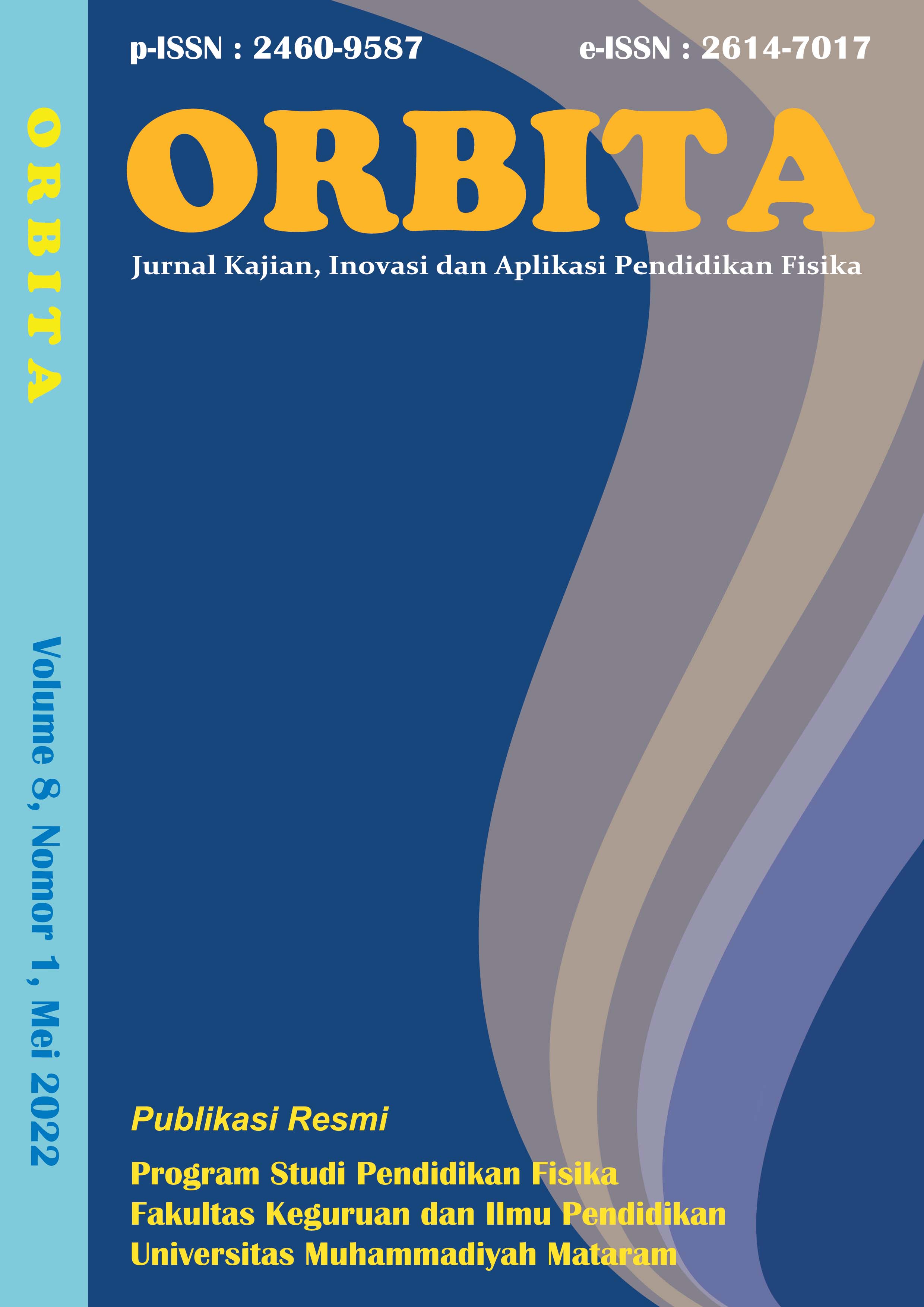ANALISIS PERUBAHAN PH DAN TEKSTUR DAGING BUAH NAGA MERAH (HYLOCEREUS POLYRHIZUS) OLEH PENGARUH PAPARAN MEDAN MAGNET EXTREMELY LOW FREQUENCY (ELF)
DOI:
https://doi.org/10.31764/orbita.v8i1.8609Keywords:
red dragon fruit, magnetic field, extremely low frequency.Abstract
ABSTRAK
Buah naga daging merah keunguan dengan nama latin Hylocereus polyrhizus merupakan salah satu jenis produk holtikultura yang saat ini sedang populer. Kandungan air 90% membuat buah ini cukup kaya akan mineral. Namun, kandungan air yang tinggi dalam buah menyebabkan buah naga merah tergolong dalam perishable commmodities yang mudah mengalami kerusakan dan pembusukan jika disimpan dalam suhu kamar. Penelitian ini bertujuan untuk mengkaji pengaruh paparan medan magnet Extremely Low Frequency (ELF) terhadap perubahan pH dan tekstur daging buah naga merah sebagai indikator pembusukan. Penelitian ini menggunakan sampel  sebanyak 165 potong daging buah naga merah dengan 25 sampel kelompok kontrol, 20 sampel kelompok kulkas, dan 125 sampel kelompok eksperimen. Kelompok eksperimen merupakan kelompok dengan perlakuan diberi paparan medan magnet ELF intensitas 600  dan 1000  selama paparan 30 menit, 60 menit, dan 90 menit. Hasil penelitian menunjukkan bahwa paparan medan magnet ELF berpengaruh terhadap perubahan pH dan tekstur daging buah naga merah. Paparan medan magnet ELF mampu menghambat pertumbuhan bakteri pembusuk pada daging buah naga merah, sehingga nilai pH meningkat dan tekstur daging buah naga bertahan padat. Dalam penelitian ini, Intensitas 600  lama paparan 60 menit efektif dalam menghambat pembusukan daging buah naga merah.
Kata kunci: buah naga merah;medan magnet; extremely low frequency (ELF).
Â
ABSTRACT
Purplish red flesh dragon fruit with the Latin name Hylocereus polyrhizus is one type of horticultural product that is currently popular. The water content of 90% makes this fruit quite rich in minerals. However, the high water content in the fruit causes red dragon fruit to be classified as perishable commodities which are easily damaged and spoiled if stored at room temperature. This study aims to examine the effect of exposure to Extremely Low Frequency (ELF) magnetic fields on changes in pH and texture of red dragon fruit flesh as an indicator of decay. This study used a sample of 165 pieces of red dragon fruit flesh with 25 samples of the control group, 20 samples of the refrigerator group, and 125 samples of the experimental group. The experimental group was the treatment group that was exposed to an ELF magnetic field with an intensity of 600  dan 1000  for 30 minutes, 60 minutes, and 90 minutes. The results showed that exposure to the ELF magnetic field had an effect on changes in pH and texture of red dragon fruit flesh. Exposure to the ELF magnetic field was able to inhibit the growth of spoilage bacteria in red dragon fruit flesh, so that the pH value increased and the texture of dragon fruit flesh remained solid. In this study, the intensity of 600μT with 60 minutes of exposure was effective in inhibiting the rotting of red dragon fruit flesh.
Â
Keywords: red dragon fruit; magnetic field; extremely low frequency.
References
Agustina, S. D., Prasutowo, S. H. B., & Sudarti, S. (2018). ANALISIS INTENSITAS MEDAN MAGNET EXTREMELY LOW FREQUENCY (ELF) DI SEKITAR LAPTOP. Jurnal Pembelajaran Fisika, 7(3), 286–292.
Ariyani, E., Sudarti, S., & Prastowo, S. H. B. (2019). PENGARUH PAPARAN EXTREMELY LOW FREQUENCY MAGNETIC FIELD TERHADAP pH EDAMAME. Jurnal Pembelajaran Fisika, 8(3), 132–136.
Balogu, T. V., & Attansey, C. R. (2021). Effect of static magnetic field on microbial growth kinetics and physiochemical properties of nono (fermented milk drink). Journal of Microbiology, Biotechnology and Food Sciences, 2021, 75–78.
Hapsari, A. R., Azni, I. N., Giyatmi, G., & Pujilestari, S. (2020). PENGARUH KONSENTRASI KITOSAN DAN LAMA PENYIMPANAN TERHADAP BUAH NAGA MERAH (Hylocereus polyrhizus) TEROLAH MINIMAL. Jurnal Teknologi Pangan Dan Kesehatan (Journal of Food Technology and Health), 2(2), 88–96.
Iqlima, M. N. (2020). Kerusakan Sel Hepar Akibat Paparan Radiasi Elektromagnetik Telepon Seluler. Ibnu Sina: Jurnal Kedokteran Dan Kesehatan-Fakultas Kedokteran Universitas Islam Sumatera Utara, 19(1), 40–45.
Kanara, N., Ritawati, R., & Wahono, S. (2020). PENGARUH SUHU PENYIMPANAN TERHADAP TINGKAT KEMANISAN DAN DAYA SIMPAN BUAH NAGA MERAH (Hylocereus costaricensis). Prosiding Seminar Nasional Online, 383–386.
Miñano, H. L. A., Silva, A. C. de S., Souto, S., & Costa, E. J. X. (2020). Magnetic fields in food processing perspectives, applications and action models. Processes, 8(7), 814.
Rosmaiti, R. (2021). Harvest Time has an Effect to the Quality of Red Dragon Fruits (Hylocereus polyrhizus (Weber) Britton & Rose) during Storage. Gontor AGROTECH Science Journal, 7(1), 19–41.
Sudarti. (2016). Utilization of Extremely Low Frequency (ELF) Magnetic Field is as Alternative Sterilization of Salmonella typhimurium In Gado-Gado. Agriculture and Agricultural Science Procedia, 9, 317–322.
Sudarti, Prihandono, T., Ridlo, Z. R., & Kristinawati, A. (2018). Effective dose analysis of extremely low frequency (ELF) magnetic field exposure to growth of S. termophilus, L. lactis, L. acidophilus bacteria. IOP Conference Series: Materials Science and Engineering, 432(1), 12010.
Sudarti, Supriadi, B., Harijanto, A., & Ridlo, Z. R. (2020). A potency of ELF magnetic field utilization to the process of milkfish preservation (chanos chanos). Journal of Physics: Conference Series, 1465(1), 12005.
Susanty, A., & Sampepana, E. (2017). Pengaruh masa simpan buah terhadap kualitas sari buah naga merah (Hylocereus polyrhizus). Jurnal Riset Teknologi Industri, 11(2), 76–82.
Syukri, M. (2020). Pengantar Geofisika (R. Syafitri & Z. Fadhli (eds.); 1st ed.). Syiah Kuala University Press.
Yuliarti, N. (2012). Bisnis Buah Naga dengan Memanfaatkan Lahan Sempit Rumah (1st ed.). IPB Press.
Downloads
Published
Issue
Section
License
The copyright of the received article shall be assigned to the journal as the publisher of the journal. The intended copyright includes the right to publish the article in various forms (including reprints). The journal maintains the publishing rights to the published articles.
ORBITA: Jurnal Pendidikan dan Ilmu Fisika is licensed under a Creative Commons Attribution-ShareAlike 4.0 International License.

